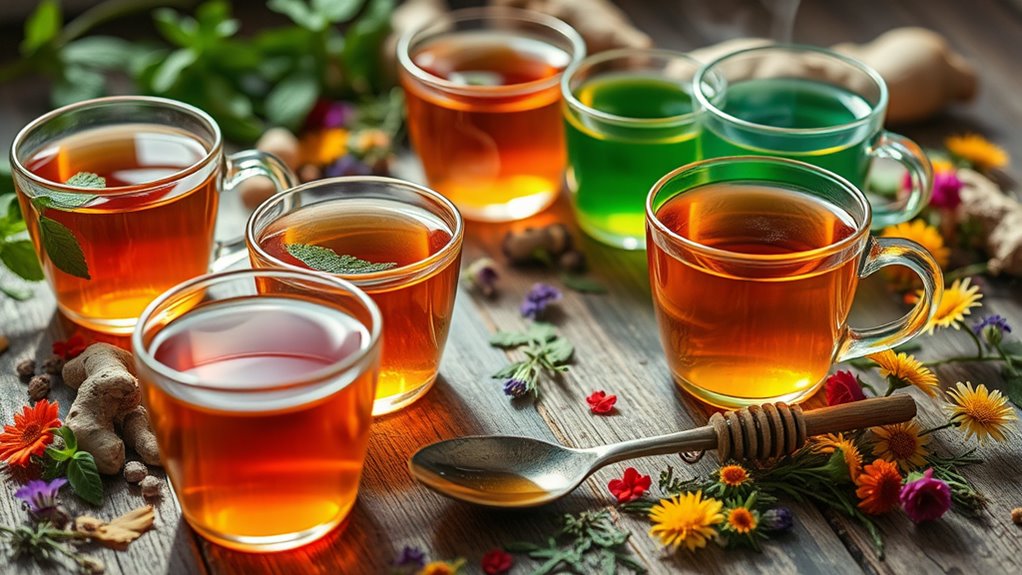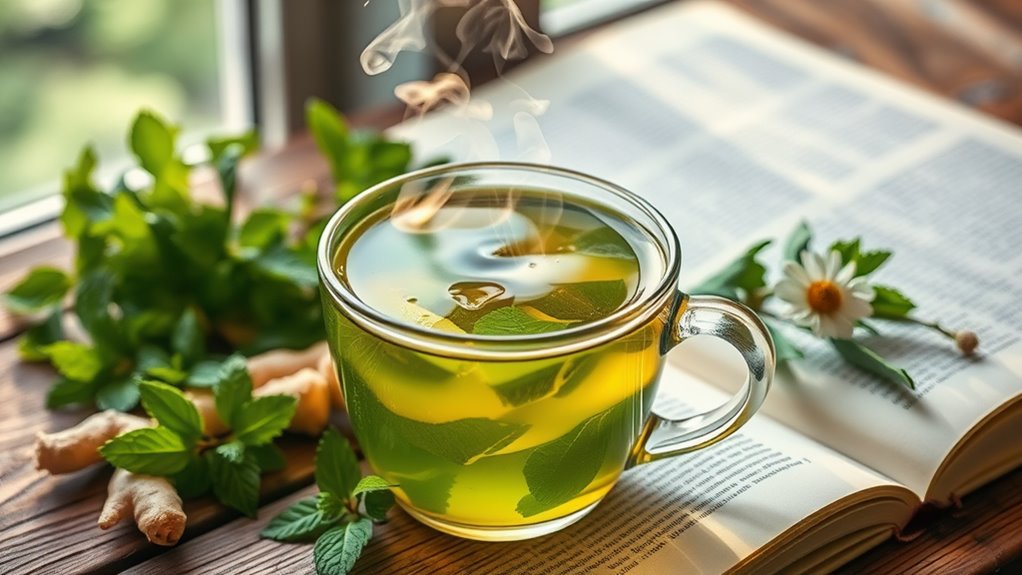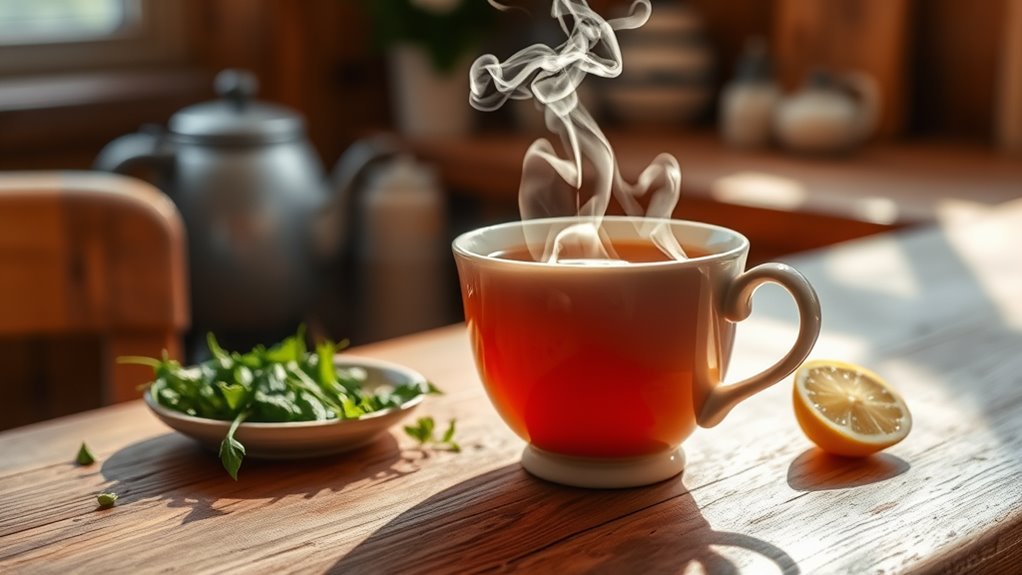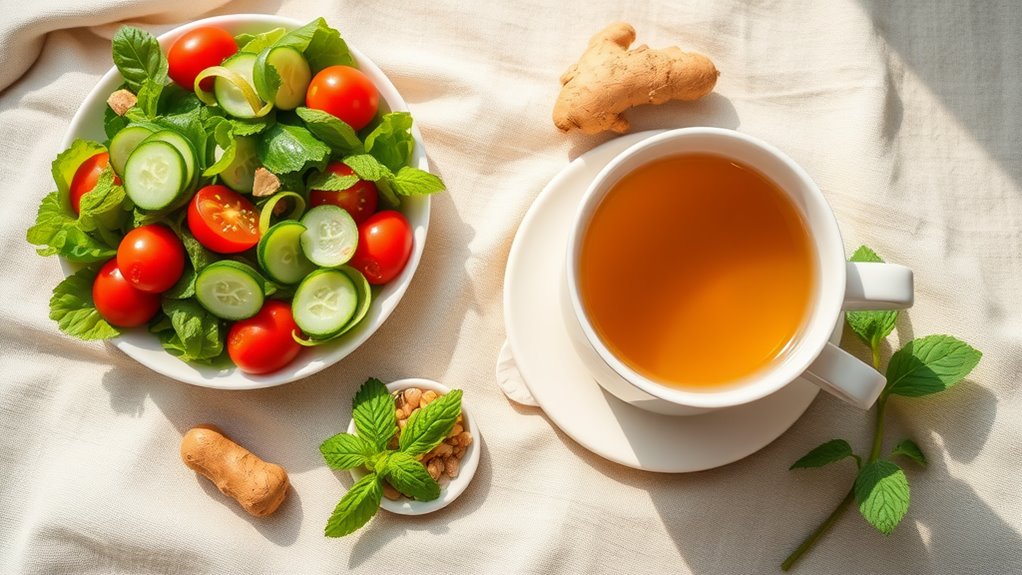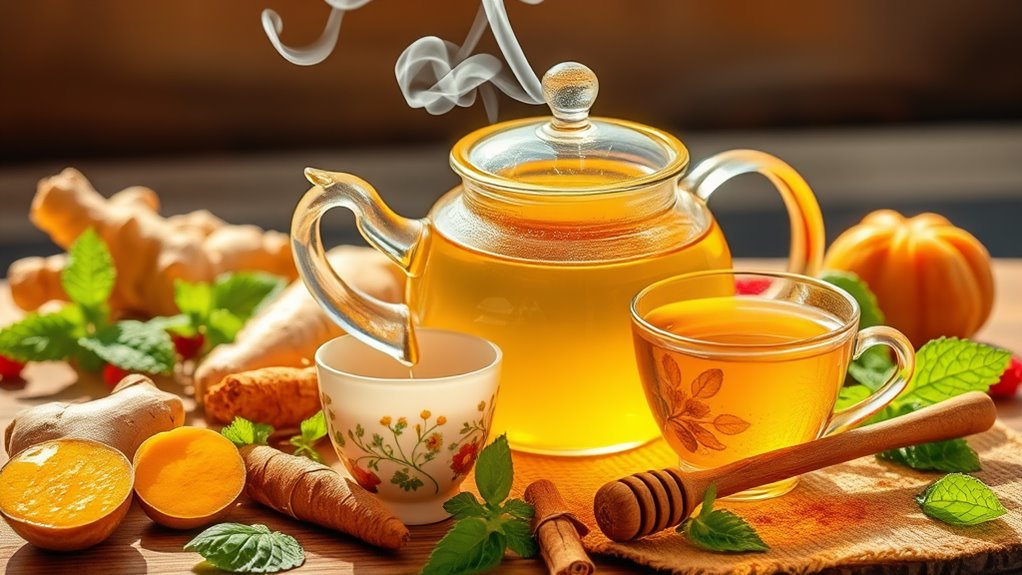Digestive Problems These Herbal Teas Will Fix It All!
If you’re facing digestive problems, herbal teas can offer natural relief! Peppermint tea soothes stomach discomfort and reduces bloating. Ginger tea tackles nausea effectively, while chamomile calms digestion and inflammation. Fennel tea helps relieve gas, and dandelion tea supports liver health. Licorice root tea eases acid reflux symptoms, and rooibos tea is a caffeine-free option for overall digestive wellness. Discover which herbal teas can best address your unique needs and turn your digestive woes into comfort!
Peppermint Tea: Soothing Stomach Discomfort
When you’re feeling the pangs of stomach discomfort, peppermint tea can be a game changer. This aromatic brew works wonders by relaxing your digestive muscles, easing bloating, and reducing gas.
You’ll find that the menthol in peppermint helps soothe your stomach lining, which can alleviate cramps and irritations. Just brew a cup, inhale that refreshing aroma, and sip slowly.
You might even notice a calming effect on your stress levels, which can also impact digestion. Plus, it’s caffeine-free, making it a perfect evening choice.
Whether you’re dealing with an upset stomach after a heavy meal or just need to unwind, peppermint tea can be your go-to remedy. So grab a cup, and let its soothing properties work their magic.
Ginger Tea: A Natural Remedy for Nausea
If peppermint tea eases stomach discomfort, ginger tea takes it a step further by tackling nausea directly. This powerful herbal remedy has been used for centuries to soothe your uneasy stomach.
When you brew a cup, you can expect relief from that queasy feeling. Here’s how to make the most of ginger tea for nausea:
- Choose fresh ginger****: Use a thumb-sized piece for maximum potency.
- Slice it thin: This increases the surface area, releasing more beneficial compounds.
- Steep properly: Allow it to steep in boiling water for at least 10 minutes.
- Add honey or lemon: Enhance the flavor while boosting its soothing properties.
With ginger tea, you’re on your way to feeling better in no time!
Chamomile Tea: Calming Digestion and Reducing Inflammation
Chamomile tea offers a gentle yet effective way to calm your digestion and reduce inflammation. When you sip this soothing brew, you’re not just treating yourself to a warm drink; you’re also easing digestive discomfort.
Chamomile’s natural anti-inflammatory properties help to relax the muscles in your gut, which can relieve cramping and bloating. Additionally, it promotes better digestion by stimulating the production of digestive enzymes.
If you struggle with an upset stomach or experience inflammation due to stress, chamomile can be a perfect choice. Drinking a cup before bed can also aid in relaxation, enhancing your overall digestive health.
Fennel Tea: Relieving Bloating and Gas
Fennel tea is a powerful ally in the fight against bloating and gas. If you’re looking for relief, sipping this herbal brew can help soothe your digestive discomfort.
Here’s how to make the most of fennel tea:
-
Brew it right: Steep one teaspoon of crushed fennel seeds in hot water for 10 minutes.
-
Drink after meals: Enjoy a cup post-meal to aid digestion and prevent bloating.
-
Combine with other herbs: Mix with peppermint or ginger for added benefits.
-
Stay consistent: Incorporate fennel tea into your daily routine for long-term relief.
With these tips, you’ll harness the soothing power of fennel tea and tackle bloating and gas effectively.
Dandelion Tea: Promoting Healthy Liver Function
Dandelion tea is a fantastic choice for those looking to support their liver health. Packed with antioxidants, it helps detoxify your liver by promoting bile production. This increased bile flow aids digestion and helps your body process fats more efficiently. If you’re dealing with occasional liver stress, sipping on dandelion tea can help relieve that burden.
Additionally, dandelion is known for its anti-inflammatory properties, which can further support liver function. You might even find that it helps reduce water retention, making you feel lighter and more energetic.
To enjoy the benefits, brew a cup of dandelion tea and savor its earthy flavor. Incorporating this herbal tea into your routine can be a simple yet effective way to promote a healthier liver.
Licorice Root Tea: Easing Acid Reflux Symptoms
If you’re struggling with acid reflux, licorice root tea might be just what you need to find relief. This herbal tea is known for its soothing properties that can help alleviate your symptoms.
Here’s how to enjoy licorice root tea for better digestion:
-
Brew the Tea: Steep 1-2 teaspoons of dried licorice root in hot water for 10-15 minutes.
-
Drink Before Meals: Consume a cup about 30 minutes before eating to help prevent acid buildup.
-
Limit Intake: Avoid excessive consumption, as too much licorice can lead to side effects.
-
Consult a Doctor: If you’re pregnant, nursing, or on medication, check with your healthcare provider before adding it to your routine.
Enjoy the soothing effects and relief licorice root tea can provide!
Rooibos Tea: A Caffeine-Free Option for Digestive Health
While many herbal teas contain caffeine, rooibos tea stands out as a delicious, caffeine-free option that can support your digestive health.
This South African herbal tea is rich in antioxidants and has anti-inflammatory properties, making it gentle on your stomach. Rooibos can help alleviate digestive discomfort and may even reduce bloating.
Its natural sweetness means you can enjoy it plain or with a splash of milk. Plus, since it’s caffeine-free, you won’t have to worry about jitters or disrupted sleep.
Drinking rooibos tea regularly can aid in maintaining a healthy gut, promoting overall digestive wellness.
Frequently Asked Questions
Can Herbal Teas Interact With Medications for Digestive Issues?
Yes, herbal teas can interact with medications. You should always consult your healthcare provider before combining them, as certain herbs may enhance or inhibit your medication’s effectiveness, leading to unwanted side effects or reduced benefits.
How Long Should I Steep Herbal Teas for Maximum Benefits?
For maximum benefits, steep your herbal teas for about 5 to 10 minutes. This allows the flavors and beneficial compounds to fully infuse, enhancing your experience and ensuring you get the most out of each cup.
Are There Any Side Effects of Consuming Herbal Teas Daily?
Yes, consuming herbal teas daily can lead to side effects like digestive upset, allergic reactions, or interactions with medications. It’s essential to monitor how your body responds and consult a healthcare professional if concerns arise.
Can Children Drink These Herbal Teas Safely?
Yes, children can drink herbal teas safely, but always check for age-appropriate options. Some herbs might not be suitable for younger ones, so consult a pediatrician first to ensure their health and safety.
What Is the Best Time of Day to Drink Digestive Herbal Teas?
The best time to drink digestive herbal teas is after meals. This helps your body digest food more effectively. You can also enjoy a cup in the evening for relaxation and to soothe your stomach.

